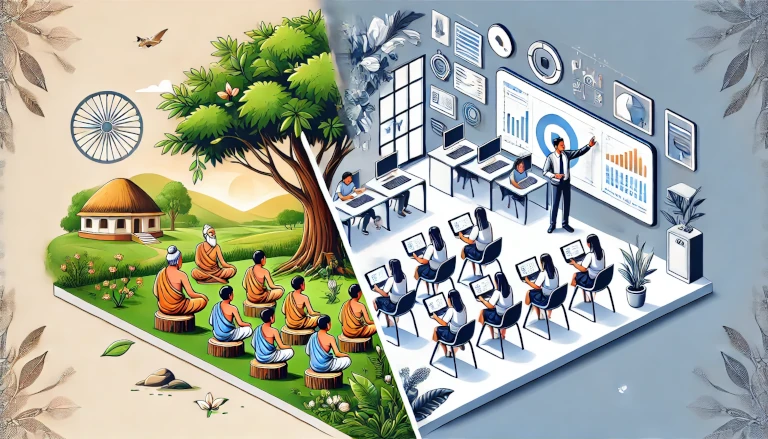Indian ancient education, particularly during the Vedic, Buddhist, and medieval periods, has left a lasting legacy of holistic, moral, and spiritual learning. The ancient education system wasn’t limited to the acquisition of knowledge but focused on nurturing wisdom, ethics, and life skills. In this article, we’ll explore how Indian ancient education can serve as an inspiration for modern education, examining key aspects that can be adopted today.
1. Gurukul System: A Model of Personalized Learning 🎓
In ancient India, the Gurukul system was a form of education where students lived with their teachers (gurus) in a residential setting. This system focused on personalized learning and mentorship, allowing students to learn at their own pace. Education wasn’t just limited to theoretical knowledge but included practical skills, ethics, and spiritual growth.
In modern times, this concept can be reflected in student-centered learning, where teachers act as mentors and guides. The idea of holistic development, which includes emotional, intellectual, and ethical growth, can inspire the modern education system to focus on developing the complete individual.
2. Integration of Nature and Learning 🌳
Ancient Indian education emphasized learning in natural settings, as seen in Gurukul schools where education often took place in open-air environments. The emphasis on learning from nature helped students develop a deep understanding of the environment and fostered a connection with the natural world.
Incorporating this into modern education can encourage outdoor learning and environmental education, teaching students to appreciate sustainability and ecological balance. Many schools today are exploring eco-friendly campuses and outdoor classrooms, which mirror this ancient wisdom.
3. Focus on Values and Ethics 🛡️
In ancient Indian education, moral and ethical values were paramount. Dharma (righteousness) and karma (actions) were central to education, teaching students to live morally upright lives. This focus on values-based education ensured that students were not only intellectually competent but also morally strong and responsible citizens.
Today, modern education often emphasizes academic achievement but may neglect character development. By adopting a values-based education model from ancient systems, modern schools can encourage integrity, empathy, and ethical decision-making in students.
4. Knowledge Beyond Subjects 📚
Ancient Indian education didn’t divide knowledge into isolated subjects. Philosophy, science, arts, and spirituality were all interwoven, promoting interdisciplinary learning. Students were taught various subjects like mathematics, astronomy, medicine, and metaphysics, alongside spiritual teachings. The goal was to produce well-rounded individuals with a broad knowledge base.
Modern education can take inspiration from this interdisciplinary approach by encouraging students to think across subject boundaries. Integrating STEM (Science, Technology, Engineering, Mathematics) with arts, humanities, and ethics can lead to more innovative thinking and problem-solving.
5. Teacher-Student Bond: Mentorship Over Instruction 🧑🏫
The relationship between the guru (teacher) and shishya (student) was deeply personal and centered on mutual respect and understanding. Teachers in ancient India were seen not merely as instructors but as life mentors who guided students in all aspects of life, from academic knowledge to personal growth.
Modern education can benefit from fostering strong teacher-student relationships, where teachers act as mentors who nurture the emotional and intellectual growth of their students. Programs like mentorship and personalized tutoring can create an environment similar to the ancient Gurukul system, providing deeper support for students.
6. Self-Discipline and Simplicity 🧘♂️
Ancient Indian education encouraged self-discipline, modesty, and a simple lifestyle, fostering a deep respect for knowledge and learning. The focus was not on material success but on personal growth, wisdom, and societal contribution.
In today’s fast-paced world, reintroducing concepts like mindfulness, discipline, and simplicity into education can help students manage stress, stay grounded, and focus on long-term personal development rather than short-term achievements.
7. Emphasis on Practical Skills and Lifelong Learning 🔧
Ancient Indian education was highly practical, teaching students skills that were directly applicable to their lives, such as agriculture, medicine, and arts. Education was not confined to childhood but was considered a lifelong pursuit.
This philosophy can inspire modern education systems to emphasize vocational training and lifelong learning, preparing students for real-world challenges and encouraging continuous skill development throughout their lives.
8. Spiritual and Holistic Growth 🌟
One of the unique aspects of Indian ancient education was the focus on spiritual growth. The integration of yoga, meditation, and spiritual practices helped students maintain mental clarity and emotional balance. The purpose of education was not just to succeed in a career but to attain self-realization and contribute to society.
Modern schools can adopt these practices to promote mental well-being and reduce stress among students. Incorporating mindfulness and meditation into daily routines can enhance focus, reduce anxiety, and improve overall well-being.
Ancient Wisdom for a Modern World 💭
The ancient Indian education system offers a wealth of wisdom that can inspire modern education. From personalized learning and teacher-student mentorship to holistic development and environmental education, these time-tested principles can create a more balanced, well-rounded education system. By integrating these ancient approaches with modern technological advancements, we can foster an education system that not only prepares students for careers but also helps them lead fulfilling, meaningful lives.
By blending the old with the new, the lessons from Indian ancient education can create a richer, more inclusive modern education system that nurtures the mind, body, and spirit. 🌿
Discover more from Green Ecosystem - Renewable Energy, Agriculture, and Environmental Sustainability
Subscribe to get the latest posts sent to your email.


